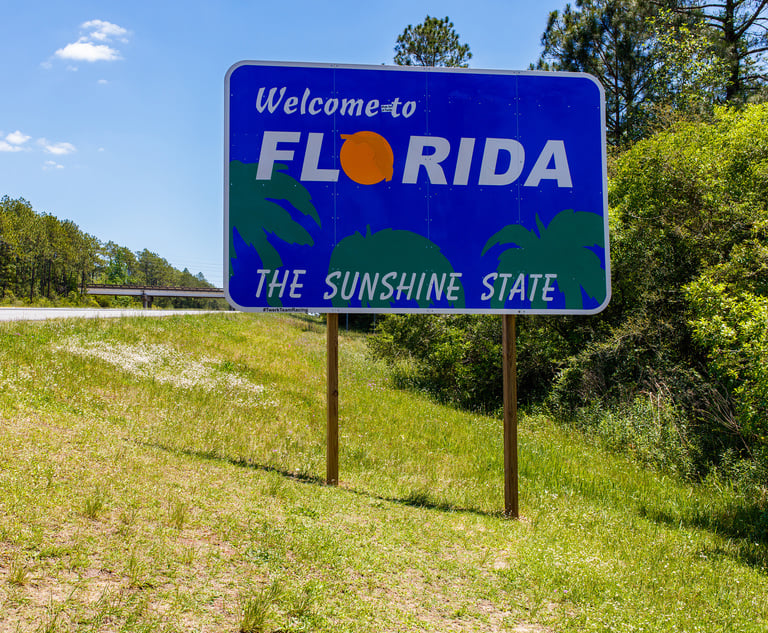As Pay Gap Widens, Some Firms Attract Associates With Other Incentives
Firms are using bonuses and a viable partnership path to lure in-demand associates.
September 12, 2019 at 03:00 PM
7 minute read
The original version of this story was published on Daily Report

The national wave of associate pay raises last year has further widened the compensation gap among law firms, leaving boutiques and regional firms struggling to attract and retain lateral associates because they can't compete on dollars.
But some Am Law 100 and 200 firms that pay somewhat below the top associate pay scale are successfully wooing top midlevel and senior associates by offering higher bonuses and the chance to actually make partner.
"Our platform allows for more flexibility, including bonuses," said Michael Hollingsworth, Nelson Mullins Riley & Scarborough's Atlanta managing partner. "We're an entrepreneurial culture."
Overall, competition is fierce among Am Law 100 and 200 firms in the Atlanta market for associate talent, with high demand across the market, according to recruiters and law firm leaders. Midlevel and senior associates in real estate, corporate and finance are sought after, while demand is softer for corporate litigation associates.
Real estate is the most in-demand practice area for firms from boutiques to nationals and globals, said Shannan Rahman, a managing partner at The Partners Group, but senior real estate associates are scarce since none were minted after the 2008 recession. "If I could magically create more real estate associates it would make my job a lot easier," Rahman said.
Am Law 100 firms generally don't recruit associates from boutiques, because of the disparity in work experience, but one recruiter said Big Law is turning to boutiques and regionals for scarce real estate associates.
In the last 18 months, for instance, Nelson Mullins, an Am Law 100 firm with a 155-lawyer Atlanta office, has recruited a real estate associate from local boutique Coleman Talley and another from Southeastern firm Balch & Bingham, according to ALM Legal Compass.
Boutiques and smaller firms are struggling to attract and retain associate talent because of the salary gap, said Rahman. "They simply can't compete based on dollars."
"Small firms are hurting, because they couldn't raise salaries the way the big firms did," said another legal recruiter who asked not to be named.
|New Salary Scale
King & Spalding and Alston & Bird were among the first firms to respond to last year's national wave of associate pay increases, matching the New York pay scale in the biggest markets but setting lower, commensurate increases in Atlanta.
The 2018 raises reset the top pay scale nationally at a range from $190,000 for first-year associates to $340,000 for eighth years. That scale applied in New York, Washington, California, Texas and Chicago.
In smaller markets such as Atlanta and Charlotte, top starting pay increased by $10,000 to $165,000 with a new top rate of $265,000 for eighth-years. Those pay raises were on top of another national round of associate salary increases in 2016.
With two rounds of pay raises in the last three years, the associate salary gap has further widened. According to recruiters, starting associate pay in smaller cities like Atlanta ranges from around the low $100,000s at top corporate boutiques and regionals to between $155,000 and $165,000 at national and global Am Law firms.
"I think the market has definitely been stretched a little bit," said legal recruiter Stephen Stone of Stone Search Partners. "You're getting increased stratification in salaries, but it's incremental."
Only a handful of firms, such as Jones Day and Paul Hastings, pay at the national, New York scale in Atlanta. A larger group of Am Law 100 and 200 firms pays the top Atlanta scale set by King & Spalding last year. That's followed by firms that only partially matched the new top Atlanta scale or stuck with the 2016 scale, followed by lower-paying regional firms and boutiques.
|Competing Via Bonuses, Partnership
Am Law 200 firms paying somewhat below the top salary scale are competing for associate talent with bigger bonuses and a viable partnership path.
Hollingsworth said Nelson Mullins keeps its base compensation competitive, even though it may not match King & Spalding or Alston & Bird all the way up the associate pay scale. "We're in the ballpark. It's not a $40,000 or $50,000 gap," Hollingsworth said.
The compensation gap does widen at more senior associate levels, Hollingsworth said, but Nelson Mullins can still compete for top talent due to a "bonus-centric" compensation model, a shorter and viable partnership track (about eight years to make nonequity partner), and a "collegial environment" where associates are given a lot of responsibility early on.
At Holland & Knight, Atlanta recruiting manager Susan Campbell said the firm is paying a midlevel associate it recently landed from an Am Law 50 firm the same salary, but three times the bonus.
"If we need an associate to serve a client, we make it work," she said, adding that, generally, that's through bonuses, but occasionally with salary adjustments.
The firm can go outside its set pay scale if there's a business reason, Campbell said. Holland & Knight hired a senior associate in Atlanta above the local pay scale from an Am Law 50 firm, because the lawyer would work for partners in higher-rate markets such as New York or Los Angeles.
"It's all about the business case," she said, adding that for each lateral hire, Holland & Knight performs a financial analysis "that assesses the pay, the client demand for the work, the hourly rate that can be commanded, and the prognosis for that work in the future."
|Long-Term Perspective
Entry-level associates with top credentials tend to take the highest salary offer, recruiters said, but midlevel and senior associates are assessing where they can make partner and build a practice.
Stone, the legal recruiter at Stone Search Partners, said entry-level associates will tell him money is just one factor and they are more interested in substantive work. But then they turn down an offer from a sophisticated, middle-market boutique with a $125,000 salary, because an Am Law firm offers $20,000 to $40,000 more, he said, and they have heavy student loan debt.
For midlevels, it's case by case, Rahman said. "If their priority is just money, Big Law is going to win."
But for more senior-level talent, she said, "They are absolutely looking beyond a paycheck at their long-term career."
For the long-term thinkers, she said, associates are moving "away from the globals paying top dollar to Am Laws and regionals paying less, but where the likelihood to make partner is higher and where they can balance career with family."
Hollingsworth said Nelson Mullins' recruiting "sweet spot" is attracting those midlevel to senior associates who are thinking long term. By their third or fourth year at an Am Law 50 firm where the chances of making partner are slim, he said, "smart young lawyers have figured out that it's not a great deal. They're working very long hours with no light at the end of the tunnel."
"Whether that realization comes in the fourth or seventh year, that's what keeps the playing field even for us," Hollingsworth said.
"These midlevels seem more astute about the big picture than 10 years ago," confirmed Campbell, the recruiting manager at Holland & Knight.
Holland & Knight has recruited associates from Atlanta-based Am Law 50 firms by offering greater advancement potential, she said, adding that one female associate chose the firm over other offers because it has female practice group leaders.
"Our fourth years are at the trial. Our fifth years are at the deal table," she said. "The midlevels look at partnership rates, level of work and work-life balance."
This content has been archived. It is available through our partners, LexisNexis® and Bloomberg Law.
To view this content, please continue to their sites.
Not a Lexis Subscriber?
Subscribe Now
Not a Bloomberg Law Subscriber?
Subscribe Now
NOT FOR REPRINT
© 2024 ALM Global, LLC, All Rights Reserved. Request academic re-use from www.copyright.com. All other uses, submit a request to [email protected]. For more information visit Asset & Logo Licensing.
You Might Like
View All

Florida-Based Law Firms Start to Lag, As New York Takes a Bigger Piece of Deals
3 minute read

European, US Litigation Funding Experts Look for Commonalities at NYU Event
Trending Stories
- 1Judge Grants Special Counsel's Motion, Dismisses Criminal Case Against Trump Without Prejudice
- 2GEICO, Travelers to Pay NY $11.3M for Cybersecurity Breaches
- 3'Professional Misconduct': Maryland Supreme Court Disbars 86-Year-Old Attorney
- 4Capital Markets Partners Expect IPO Resurgence During Trump Administration
- 5Chief Assistant District Attorney and Litigator Shortlisted for Paulding County Judgeship
Who Got The Work
Michael G. Bongiorno, Andrew Scott Dulberg and Elizabeth E. Driscoll from Wilmer Cutler Pickering Hale and Dorr have stepped in to represent Symbotic Inc., an A.I.-enabled technology platform that focuses on increasing supply chain efficiency, and other defendants in a pending shareholder derivative lawsuit. The case, filed Oct. 2 in Massachusetts District Court by the Brown Law Firm on behalf of Stephen Austen, accuses certain officers and directors of misleading investors in regard to Symbotic's potential for margin growth by failing to disclose that the company was not equipped to timely deploy its systems or manage expenses through project delays. The case, assigned to U.S. District Judge Nathaniel M. Gorton, is 1:24-cv-12522, Austen v. Cohen et al.
Who Got The Work
Edmund Polubinski and Marie Killmond of Davis Polk & Wardwell have entered appearances for data platform software development company MongoDB and other defendants in a pending shareholder derivative lawsuit. The action, filed Oct. 7 in New York Southern District Court by the Brown Law Firm, accuses the company's directors and/or officers of falsely expressing confidence in the company’s restructuring of its sales incentive plan and downplaying the severity of decreases in its upfront commitments. The case is 1:24-cv-07594, Roy v. Ittycheria et al.
Who Got The Work
Amy O. Bruchs and Kurt F. Ellison of Michael Best & Friedrich have entered appearances for Epic Systems Corp. in a pending employment discrimination lawsuit. The suit was filed Sept. 7 in Wisconsin Western District Court by Levine Eisberner LLC and Siri & Glimstad on behalf of a project manager who claims that he was wrongfully terminated after applying for a religious exemption to the defendant's COVID-19 vaccine mandate. The case, assigned to U.S. Magistrate Judge Anita Marie Boor, is 3:24-cv-00630, Secker, Nathan v. Epic Systems Corporation.
Who Got The Work
David X. Sullivan, Thomas J. Finn and Gregory A. Hall from McCarter & English have entered appearances for Sunrun Installation Services in a pending civil rights lawsuit. The complaint was filed Sept. 4 in Connecticut District Court by attorney Robert M. Berke on behalf of former employee George Edward Steins, who was arrested and charged with employing an unregistered home improvement salesperson. The complaint alleges that had Sunrun informed the Connecticut Department of Consumer Protection that the plaintiff's employment had ended in 2017 and that he no longer held Sunrun's home improvement contractor license, he would not have been hit with charges, which were dismissed in May 2024. The case, assigned to U.S. District Judge Jeffrey A. Meyer, is 3:24-cv-01423, Steins v. Sunrun, Inc. et al.
Who Got The Work
Greenberg Traurig shareholder Joshua L. Raskin has entered an appearance for boohoo.com UK Ltd. in a pending patent infringement lawsuit. The suit, filed Sept. 3 in Texas Eastern District Court by Rozier Hardt McDonough on behalf of Alto Dynamics, asserts five patents related to an online shopping platform. The case, assigned to U.S. District Judge Rodney Gilstrap, is 2:24-cv-00719, Alto Dynamics, LLC v. boohoo.com UK Limited.
Featured Firms
Law Offices of Gary Martin Hays & Associates, P.C.
(470) 294-1674
Law Offices of Mark E. Salomone
(857) 444-6468
Smith & Hassler
(713) 739-1250








